My tour of duty in Vietnam officially began January 9th, 1970 and officially ended January 9th, 1971, though in actuality I started and left a bit earlier. 1970 was the Year of the Dog according to the Chinese Zodiac. I’m not sure I fully appreciate the significance of that; however, I understand it’s got something to do with loyalty, kindness, caution and prudence. I don’t recall seeing those attributes exhibited at all times during my year in Vietnam, but did see all of them exhibited on occasion. And we did have a hootch dog, his name was Noah, and he was the topic of an earlier blog story. (Reference my blog article “Noah”)
I served in the U.S. Air Force mostly in Binh Dinh province, Phu Cat Airbase in the Central Highlands of South Vietnam. Among the 22 provinces of South Vietnam, Binh Dinh had the 5th highest U.S. casualty rate of the war.
As the Plug was Pulled
By the end of 1970, U.S. involvement in Vietnam had tapered off significantly; the war was being handed over to the South Vietnamese military, be they ready or not. From a high point of 560,000 troops in 1968, American ground forces were down to 200,000 by the end of the year. (*Note 1)
Although the U.S. was involved in many small offensive battles throughout 1970, the invasion of Cambodia (in which thirteen major operations were launched between the beginning of May and the end of June of that year) was the last major land offensive of the war, for the U.S.
Our five allies who had been bribed or coerced into the war by previous administrations, also scaled back their involvement. South Korea, Australia, New Zealand, Thailand and the Philippines all began pulling troops and supplies out of the country, some more rapidly than others. The South Koreans (ROKS) provided much needed support and cover for U.S. forces, particularly around the large airbases.
As a result of the rapid implementation of Vietnamization, the war went off the rails, with equipment and material shortages plaguing those units that remained. Moreover, as combat troops were pulled out, airbases and other major installations were subjected to increasingly heavier attacks by emboldened VC (Vietcong) and NVA (North Vietnamese Army) forces.
And by 1970, the war had soured with the American public, and the world in general, making U.S. military personnel more and more unpopular, at home and abroad. With the well poisoned in the U.S. regarding the war, the negativity migrated to the military as well. Drug use and disciplinary problems by U.S. troops in Vietnam increased substantially during that time, creating additional problems for the military hierarchy.
One positive event for the U.S. war effort, did actually occur in July of 1970. North Vietnam’s two major supporters, China and the Soviet Union, were severely at odds with each other. In July of 1970, as a result of the North Vietnamese cozying up to the Soviet Union, China removed all it’s troops that had been supporting Chinese made anti-aircraft batteries in North Vietnam.
Nevertheless, the direction of the war continued a downward spiral for the U.S. in Southeast Asia. In Cambodia and Laos, volatile political climates and questionable allegiances stifled U.S. military efforts in those two countries.
And while back home, the deaths of 4 students and wounding of 9 others at Kent State University brought outrage, in 1970, 6,800 more U.S. troops lost their lives in Vietnam, with another 50,000 wounded, and an unknown number missing in action. Another 380,000 Vietnamese were killed during that year, along with tens of thousands of Cambodians, Laotians and U.S. allies who were still in-country.
Some 3 million gallons of Agent Orange were dispersed in South Vietnam in 1970, along with another million gallons dispersed in Cambodia and Laos.
Moreover, in 1970, the Vietnam War cost the U.S. over $8 Billion, with almost none of that being recoverable in any form at any time. The black market, as might be expected, was rampant toward the end of the war. U.S. material and equipment that was unloaded on docks in the early morning hours, could often be found in black market operations along the roadways by the afternoon. With the sand running out of the glass, those who sought to enrichen themselves through currency manipulation schemes, drug sales and other illicit operations, now felt a sense of urgency. Make hay while the sun shines.
My Involvement in the Closures
I was basically a supply pusher who probably got shot at a lot more than I should have, due to the circumstances of my duties and the time period in which I served. I was involved with the closing of Nha Trang Air Base, to some extent, and also involved in some early closing out activities at Phu Cat Airbase, which is where I spent most of my time in Vietnam. Previous blog articles “Flying the Friendly Skies of Vietnam”, “The ROKs”, and “The Lieutenant’s Sign” reflect on some of those activities.
I had it pretty cushy compared to the flight crews who flew every day in all kinds of conditions, and much cushier than the Grunts, of whom I hold the utmost respect. My friend and fellow author John Podlaski, was a grunt with the Wolfhounds and has written several excellent books regarding his experiences during that time. John also has a website, Cherrieswriter, with many fine articles and discussions on the war.
I happily left Vietnam in January of 1971. Exactly one year later, Phu Cat Airbase was turned over to the South Vietnamese military. In 1975, it fell to the North Vietnamese Army.
The Year of the Dog, and Vietnam now lay behind me.
(Though Vietnam lay behind me, the next Year of the Dog after 1970, was 1982..the year I got married) 🙂
*Note 1
After the Paris Peace Accords, signed in January of 1973, the vast majority of remaining U.S. troops departed Vietnam within the next 60 days, with just a handful of special duty forces, in several locations in South Vietnam staying on. After 1973 air operations in South Vietnam were conducted by the South Vietnamese Air Force or American air forces from outside of Vietnam. Between August 1973 and the fall of Saigon in 1975, air operations in Vietnam were carried out by U.S. Air Force units in Thailand and Guam, and by U.S. Naval units in the Gulf of Tonkin.
You are welcome to share Joe’s stories in their entirety, citing Joe as the creator. Copyright protected, all rights reserved © Joe Campolo Jr

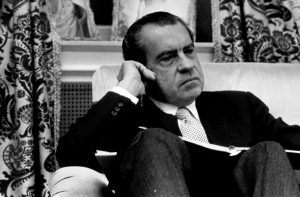
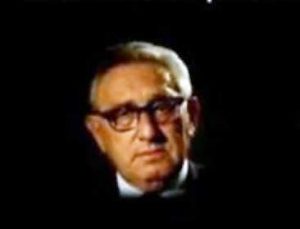

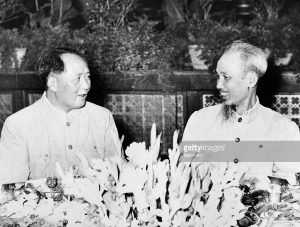
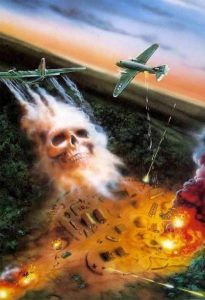
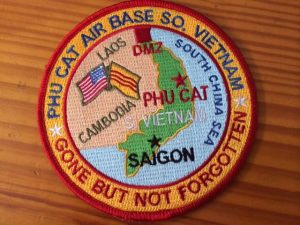
Hi Joe, thanks for the history lesson. I remember those times even though I didn’t serve and still wish that none of us had to remember.
Thanks for the feedback Rick, glad you enjoyed the article.
Even though I am proud to have served in the latter years of the war, it was such a sad ending to an ugly war. Thanks for the article Joe and thank you for your service.
Good to hear from you Bob. It was a sad ending indeed. Glad you like the article, and thank you for your service as well.